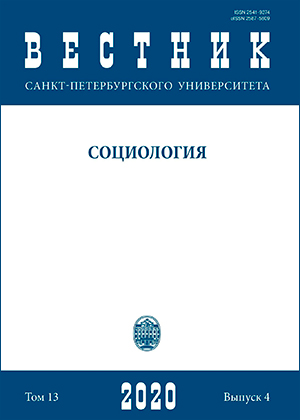Культурные модели принятия коррумпированных решений в российских организациях
DOI:
https://doi.org/10.21638/spbu12.2020.403Аннотация
Несмотря на формальные усилия по борьбе с коррупцией, в России она представляется постоянной, стойкой проблемой с многочисленными социальными последствиями. Причины устойчивости коррупции могут быть рассмотрены как с точки зрения инертных политическими структур, так и с точки зрения конкретных коррупциогенных механизмов на уровне акторов. Однако в первом случае отсутствует возможность обобщенного объяснения коррупции, во втором — невозможно учесть переплетение коррупционных практик с конкретными культурными моделями. Современные подходы изучения организаций позволяют плодотворно связать оба подхода в концепцию организационной коррупции. Эта концепция объясняет коррупцию как процесс нормализации в организационном контексте. Статья направлена на распространение такого подхода на аналитическую модель принятия решений в организациях. Эта модель должна: i) сохранить теоретическую обобщенность объяснения коррупционной практики, ii) оставаться концептуально открытой для анализа микро-, мезо- и макропроцессов и iii) стать достаточно конкретной для реинтеграции результатов предыдущих исследований и будущих сравнительных исследований коррупции. Исходя из неоинституциональной теоретической базы ситуации принятия решений в организациях рассматриваются в противоречии между формально-юридическими параметрами и легитимными целями организации, закрепленными в ее формальной структуре. В зависимости от того, направлены ли решения против правовых параметров и организационных целей или они принимаются в соответствии с ними, изменяется вероятность конформистских решений, информаторства (whistle blowing), индивидуальной или организационной коррупции. Теория учитывает влияние культурных феноменов и факторов организационной культуры на процесс принятия решений. Модель учитывает связь определенных российских концепций и понятий, предполагающих влияние на коррупцию.
Ключевые слова:
организационная коррупция, неоинституциональный подход, аналитические рамки, коррумпированные решения, культурные паттерны
Скачивания
Библиографические ссылки
References
Загрузки
Опубликован
Как цитировать
Выпуск
Раздел
Лицензия
Статьи журнала «Вестник Санкт-Петербургского университета. Социология» находятся в открытом доступе и распространяются в соответствии с условиями Лицензионного Договора с Санкт-Петербургским государственным университетом, который бесплатно предоставляет авторам неограниченное распространение и самостоятельное архивирование.




